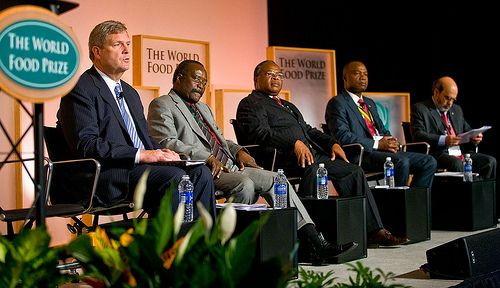World Food Prize Awarded To Three Biotech Scientists For Work In GMO Crops, Pushing Controversy Even Further

The controversy swirling around genetically modified organisms (GMO) now has more fuel to its fire. On Wednesday, the World Food Prize Foundation bestowed its annual award upon three biotechnology scientists whose work brought the world genetically modified crops.
Marc Van Montagu, founder and chairman of the Institute of Plant Biotechnology Outreach at Ghent University in Belgium; Mary-Dell Chilton, founder and researcher at Syngenta Biotechnology; and Robert Fraley, chief technology officer at Monsanto, comprised the trio. Their prize-winning work on transferring foreign genes to plants in the 1980s and 1990s set a precedent for how the agribusiness industry functions today.
The private nonprofit foundation acknowledges the statement it is potentially making in choosing this year's recipients.
"If we were to be deterred by a controversy, that would diminish our prize," said the foundation's president, Kenneth Quinn, a retired U.S. diplomat.
In the 1980s, Montagu and Chilton independently developed the first systems to make genetically modified plants a possibility. The ensuing race in the scientific community was punctuated by Fraley's successful engineering of a soybean plant's immunity in 1996, which made the plant resistant to herbicide.
The World Food Prize Foundation lists Monsanto and Syngenta Foundation among its annual donors, along with other agribusiness corporations such as DuPont Pioneer, Archer Daniels Midland Co. and Cargill, the AP reports.
While GMO crops generate much controversy, their prevalence has swelled to considerable proportions, with many farmers praising the genetic modifications for saving their plants during periods of draught. Corn producers, in particular, saw the worst draught in 60 years in 2012, and many farmers credited the use of GMO crops in helping them avoid devastation.
Of course, a discussion on GMO crops has critics knocking at the door. The foundation drew its fair share of antagonists when it announced the prize's recipients.
"We could not ask for a better poster child for what's wrong with the prize than the recipients of this year's World Food Prize," said Frank Cordaro, who organized an Occupy World Food Prize protest last year. "It's all part of the very same system of the corporate elite. The problem is not with the recipients, the problem is with the system that gives the 1 percent all the power and corporate agriculture is built on that system."
Cordaro sits shoulder-to-shoulder with a host of people who oppose corporate farming (count among them ice cream producer, Ben & Jerry's) and are wary of the health risks posed by GMO crops.
"GMO crops have led to the loss of food security worldwide and for small farmers, they have led to the development of factory farms and have destroyed biodiversity in food we do produce and consume," said David Goodner, a community organizer for Iowa Citizens for Community Improvement, an activist group that oppose corporate farming and promotes "putting people first."
"The World Food Prize by selecting these people to honor shows that it cares more about corporate profits than it cares about truly feeding the world with healthy food," Goodner added.
However, one of the prize's recipients argues the foundation's selection does a service for society in educating them about GMO crops safety. Montagu said the genetically modified crops he helped to develop do not threaten a person's health any more than food grown naturally.
"We just have to explain to society the science fact and that is not the slightest risk has been identified. These crops are as safe, if not safer, than food that comes from traditional agriculture," he said. "If somebody denies that we bluntly can say they are misinformed."
Recipients of the prize will receive $250,000 at a ceremony in October, where hundreds of members of the international agribusiness community and academic scholars will descend upon the Iowa Capitol in Des Moines.
The World Food Prize was created in 1986 by Norman Borlaug, winner of the Nobel Peace Prize for his efforts to fight hunger.



























